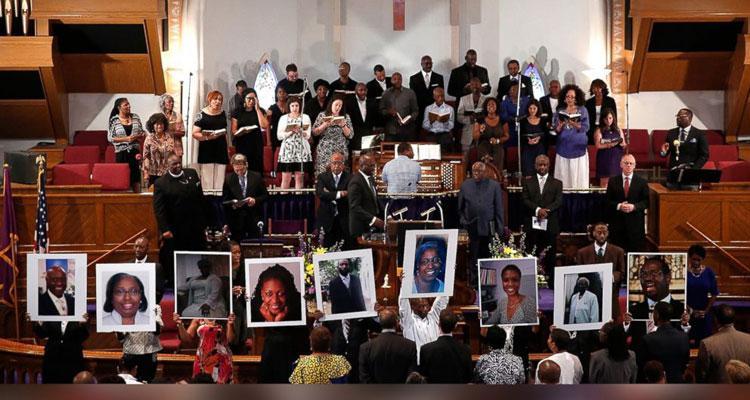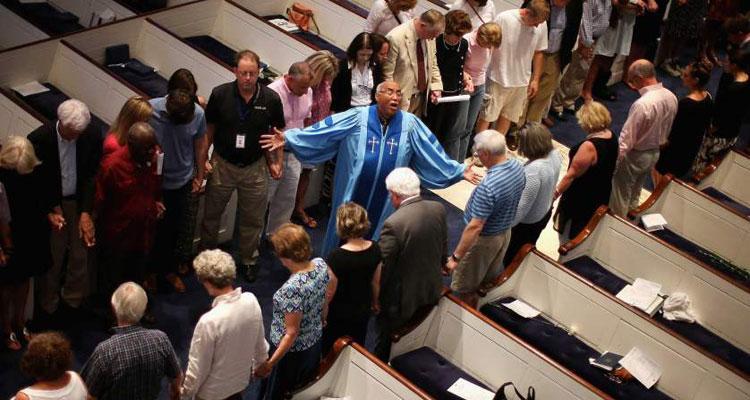What are we to do? I am still in shock about the killing of nine parishioners at the Emanuel A.M.E. Church in Charleston, South Carolina by a young white gunman who apparently wrote a manifesto of racial hatred born of deep ignorance. I know that, like me, many people are still trying to find a way to process this tragedy which is quite difficult as we are sucked in by the 24-hour news circle and the politicians leading us down the familiar rabbit holes of controversy. I am a person who talks, writes and teaches about racial bias so, of course, I am not ignorant to or in denial about the pernicious reality of racial bigotry that drove Roof’s hateful acts and that is embedded in our national psyche. However, at this moment, I find no solace or clarity in unpacking the long history of racism in our country or arguing about gun control, what constitutes terrorism, the death penalty or the confederate flag.
The tragic killings of young black and brown women and men by the police have brought collective outrage and movement, but at the same time, I believe some Americans have been estranged from these victims. In the quiet of their own soul, they have found ways to distance themselves from these slain individuals – a belief that maybe they are guilty and responsible for the outcome in some way: Freddie Gray had been in trouble before; Eric Garner was resisting arrest; Trayvon Martin fought back.

But this tragedy is different. How much closer can you get to innocence than a Wednesday night prayer meeting in church? Many of us can imagine ourselves in the shoes of those who were taken, their families and communities. We understand when we look at the pictures of the nine slaughtered and their wailing families that we too are their relatives. We wonder what we would do. How we would feel. How the families can forgive so quickly. Could we do the same?
This wake-up call sounds louder than all the rest. With this one, we can feel the truth that whatever happens to our neighbors, even if they are miles, countries or continents away, happens to us all. So my heart is gladdened when I see people coming out from all communities, faith and colors to stand with those from Charleston, and to resist the fear. It makes me believe that as humans we are remembering what matters. We recognize that when one group is persecuted or unsafe we are all in trouble. We remember that we are one – we recognize there is one race – the human one. We begin to see that anti-black racism is just one of the lies that keep us from seeing our common destiny. It is a salve, a balm whenever we see our unity and are compelled to come together.
But then I begin to wonder how long it will last – how long before we get sucked back into our balkanized daily existences and petty distinctions? How and when will we start again to scapegoat, point fingers, go back inside to hide and hold tightly to our stuff and our cherished world views? How long before our fears of one another grow and our divisions deepen?
As we get more details of the massacre, and the politicians and media do their things, our hearts and wills will falter, our emotions will dampen and some of us will hear a call back to our familiar groove of despair – feeling a profound sense of impotence – things are getting worse and there is no hope. Others will go back to their denial of racial injustice even as they compliment Black people in Charleston for acting with such grace and decorum, wondering why more Black people can’t act this way instead of “rioting,” and burning their neighborhoods down. Unaware of course of the extraordinary ways Black people show and have always shown faith, restraint and forgiveness on a daily basis in the face of years of hateful violence against them.

My hope, my prayer, for this moment, this horrendous wake-up call is that we stay awake – that we resist the downward spiral and denial and we find ways to act in furtherance of the world we want to live in. Everyday, in so many small and greater ways we can interact with fellow humans to affirm our connectedness and create a society where racism and other forms of separation are eradicated.
Everyday we can choose words of love instead of criticism. We can give a kind word or compliment when none is required. We can acknowledge each other’s existence on the street, in the grocery line. We can say thank you. We can decide not to look down on or think less of those who take up residence on our streets, especially in the warmer seasons. We can challenge and refuse to “share” the nasty biases, comments, cartoons our “friends” and family send around on Facebook. We can hire people who need jobs and invest in business enterprises and efforts that help eliminate inequity. We can mentor the young and old. We can educate ourselves about the histories, the tragedies and the triumphs of black Americans and other marginalized groups. We can listen more to those whose experiences in this country are different from our own. We can ask ourselves why we believe what we believe and which stories serve to further separate us. WE CAN TEACH OUR CHILDREN to understand the disparities and systemic exclusion that have skewed the opportunities away from certain groups in favor of others in this county. We can tell them not to believe the campaign of misinformation behind the anti-black racism that warped Dylann Roof’s mind. We can stand up for those who are being treated unfairly in our workplaces, cities and towns and we can support social justice actions with our money and our participation.
We can show the courage to love as the families of the nine victims have done and go beyond our comfort zone. Hate, fear, distance come easy, but love, empathy, compassion- these are the truths of who we are too. My hope, my prayer for this moment, is that we decide to stand up for love, life, and light and we transform this horrible tragedy into daily acts of love, connection and compassion. I believe if we answer this profound call together, we will win.


